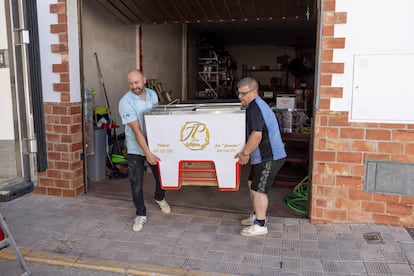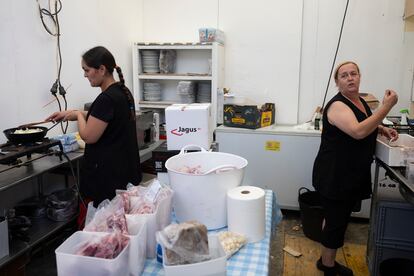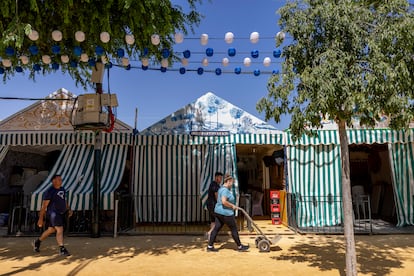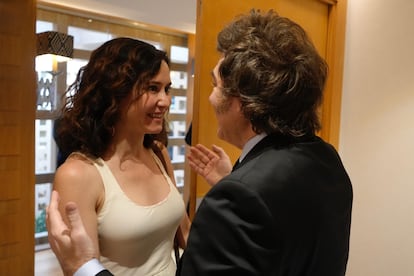The people who stop for others to dance | Spain

50 kilometers south of Seville there is a town, the Palmar de Troya, which spoke with the fairs. Half of their neighbors come to work in the booths of the Fairs in Seville, Jerez, the port of Santa María or Alcalá de Guadaíra to become the labor that allows these municipalities to live in their big week of the year, with the fun to every fuse. They are riding of booths, waiters, chefs, ham cutters and security guards who between April and October raise ephemeral villages outside each Andalusian locality to dismantle them five days later. The working conditions of these eventual employees have improved the last five years, but the abuses of entrepreneurs follow the agenda. Meanwhile, these spring days the silence Copa El Palmar de Troya (2,300 inhabitants, Seville), which in half reduces its conversations.
The workers of this town are used to emigrating to win the wage, and outside the fairs there are many who still go to the harvest or the collection of the olive. They went to the Strawberry in Huelva, before the mass hiring of Moroccan and Latin American employees. The mayor, Juan Carlos González (PSOE), estimates that half of the active population moves to the Andalusian fairs to work. Sometimes hired by the numerous caterin companies of the town, and others with permits or vacation days to go to the fairs of other peoples. There are no official figures from displaced neighbors. These days workers accept authentic workflowers with the physical capacity of endurance to the limit.
Sandra Carreño, 39 -year -old waitress, hurries coffee at noon suffocating on the main avenue of the town, with little transit. « At the Fair you put about 17 hours, but the bosses always put eight (declared to Social Security). Carreño receives 180 euros for each day of the fair. He was in that of Seville and now works at that of Alcalá de Guadaíra (75,000 inhabitants), on the outskirts of the Andalusian capital.
At the gates of the Federico García Lorca Public College, María, who declines to give her last name and with 17 years behind her back seasons, abounds in the labor abuse of cassette businessmen. « At the fairs we have been scammed. When you finished your 15 -hour day, you collected, but then you saw that in your working life only was two days and two hours every day, » he complains. « When I became pregnant, I stopped, because that is to leave the children. There are people who only see their children on Mondays after the fair ends. I am very regretful of those 17 years, » he laments. She charged 130 euros a day and now her husband, Fernando, a vacuum ham cutter, charges 250 euros when he goes to a fair. In 2000 it was built in the Troy Palmar A residence for temporary childrenthat once welcomed these minors while their parents emigrated for different crops in the Peninsula and France.
Patricio Ponce, cassetter entrepreneur, transports his furniture, counters, showcases and portable air conditioning from his ship to the truck, before leaving the Burguillos Fair (Seville), where he directs two booths and 12 employees: “The government is suffocating us with social security, that’s why there are so much so much GRANUJERIIO, that does not exist in Ireland or Luxembourg. What is needed is that people cite, you can’t get soak so much. Because if it rains or 40 degrees, you stay alone in the house and lose money, ”he laments.
The Andalusian Association of Hospitality Entrepreneurs of Feria, with a hundred associated cassette businessmen, considers that the fairs decrease due to lack of labor. « People are looking for more stable jobs. We have asked the government for a dinner (specific code for economic activity) for the sector, but without success. So in theory employees must work eight hours and four other extra, and thus our work is increasingly complicated, we cannot double the templates, » complains its president, David Martín. « The one dedicated to the fairs does not want to rest, wants to make money. The one who goes to the pilgrimage of El Rocío has a stable job and is requested five days of permission in his post, » he adds.
The Labor Inspection has reinforced since 2022 the controls at the fairs to verify the high employees in Social Security, especially in the prevention of occupational hazards in the assembly and disassembly of booths. « We review aspects such as the day, part -time work, the registration of the day and the safety conditions at work, » says Esther Azorit, head of inspection in Seville. If at the April 2022 fair they made 371 performances in the booths, last year they rose to 634 performances.
Before the forced flight of many Palmareños parents, the children remain in the care of grandparents and the academic performance of certain students descend. « Grandparents have more permissiveness and some students are missing things to bring. Performance lowers a little, are more distracted. I am struck that children between 5 and 8 years have access to new technologies too soon. They have a video game console, but then they do not know how to do a puzzle, » Ana Auxiliadora Fernández, special needs professor of the public school of the town. The director of this center with 206 students, Daniel Domínguez, reduces the effect of the absence of parents at home so many weeks: « Before you notice more. Grandparents are more permissive, but we no longer have absentee students and academic results are superior to previous years, » he values.

At noon last Wednesday at the Alcalá de Guadaíra Fair the lantern already covered the roofs of the booths, almost everything ready for the opening dinner. Dolores Palomino, 56, has bloody hands to clean anchovies in the kitchen of a booth, with suffocating heat. This Palmareña has been, since the age of 16, making fairs of towns in Seville, Cádiz, Málaga and Granada. « He does not compensate. He is not paid so much physical effort, wear and family, that we lose everything. My three children have needed me in many moments, » he recalls, while teaching a great lump that comes out of the arm tendon.
Surrounded by meat packages, in the kitchen there is a pot with boiling eggs for the salmorejo garrison. Outside the thermometer already exceeds 30 degrees, but here the heat shoots with the fires on and the engines running. The booth has air conditioning, but only for the partners, the freshness does not reach the cooks in the back room. « The Seville Fair is the worst because there is no place for garbage (which must only take out in the morning, from 5 to 9.00) and accumulate in the kitchens, » Palomino laments, which works from 11 in the morning to 2.30 in the morning. In most Andalusian fairs the glass is recycled, but plastics, cartons and organic remains are mixed with the apathy of the municipalities, which do not allocate sufficient resources so that the separation of the tons of garbage generated is a fact.
Next to her, the young Naima Hamed, from Tenerife, explains how she ended up between stoves: « My grandmother regretted giving me the kitchen. And yet I like the tract, with the stress of the peak hours, » he says. The boss interrupts: « We are 60 for dinner today. » From the kitchen kilos and kilos of chocos, anchovies, stretches, scrambled, potato dressings, sirloin with bakery potatoes and other typical fair dishes, always with prices higher than restaurants.
Andalusian families are aware that Fair Week is special, and some even ask for credits to cope with so much expense. The Camarera Carreño confirms it: “The fair is a luxury and I have partners who spend 2,000 euros in one day. The fat people continue to ask for loans and distribute the money among their children, to 2,000 euros for the week per beard, although they are just 18 years old. And pay 12 euros for a single crayfish, one!, Or 25 euros for six knives. A madness”.









